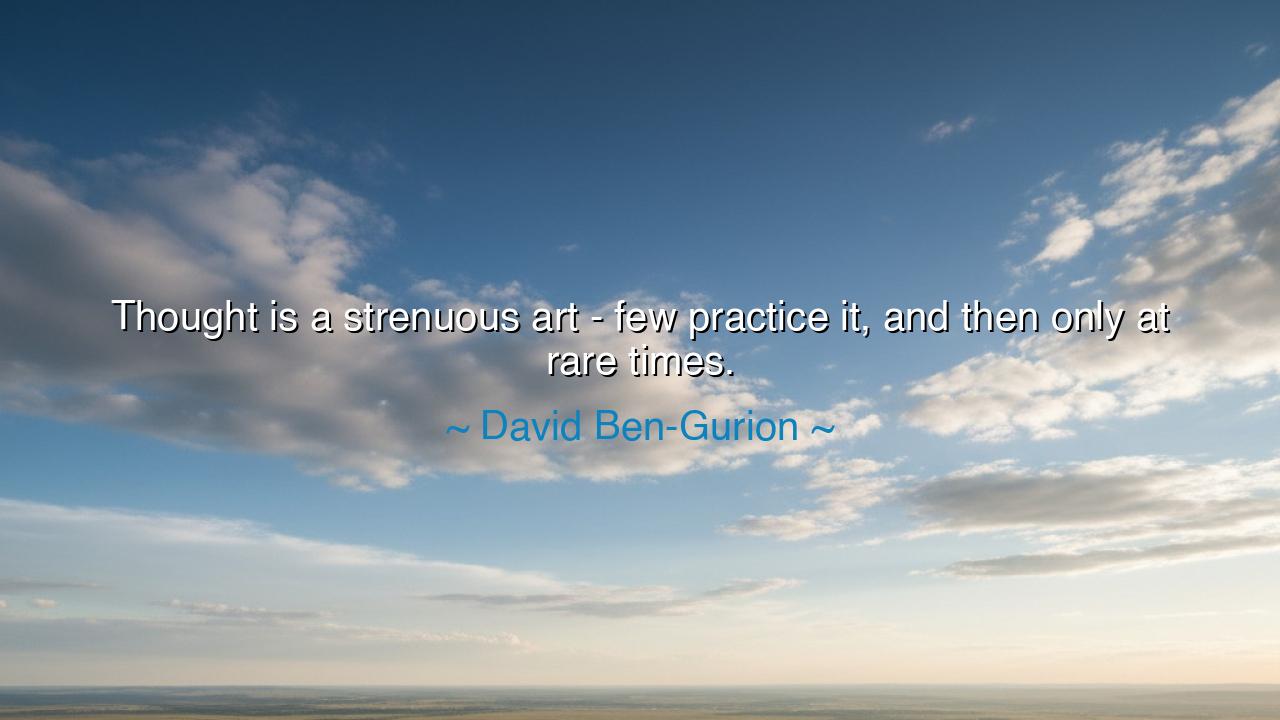
Thought is a strenuous art - few practice it, and then only at






“Thought is a strenuous art — few practice it, and then only at rare times.” So spoke David Ben-Gurion, the founding father of modern Israel — a man of vision, courage, and relentless intellect. In this statement, he unveils a truth that pierces the heart of human existence: that thinking, true and deliberate thinking, is not a habit of the many, but a discipline of the few. It is not a passive act, like breathing or walking; it is a labor of the soul, an art that demands courage, honesty, and endurance. To think is to wrestle with the unseen, to question what others accept, to stand alone against the tide of unexamined certainty.
Ben-Gurion lived in an age of struggle and creation. He helped shape a nation from the dust of exile, leading a people who had long wandered in the wilderness of history. For him, thought was not a luxury of scholars — it was the forge of destiny. In the chaos of politics and war, he understood that only those who think deeply can see beyond the storm. His words were born from the weight of leadership, from the sleepless nights spent confronting questions no one else dared to ask: What is right? What is possible? What is worth dying for? He knew that most men prefer to repeat, to follow, to feel — but not to think, for thinking demands the sacrifice of comfort.
When Ben-Gurion called thought a “strenuous art,” he echoed the ancient sages. Socrates walked the streets of Athens and asked his fellow citizens to question their beliefs — and for that, he drank the cup of poison. Galileo, in defying the false wisdom of his age, was condemned for daring to think differently about the heavens. True thinking is never easy; it is rebellion clothed in reason, fire wrapped in silence. The world has always feared the thinker, because he cannot be ruled by slogans or seduced by noise. His allegiance is not to opinion, but to truth, and truth is a master that demands everything.
Most people mistake information for thought. They consume facts, repeat arguments, and call it knowledge. But to think, as Ben-Gurion meant it, is not to collect — it is to create, to shape meaning out of chaos. It requires solitude, patience, and courage to confront one’s own ignorance. The mind, like a muscle, must labor against resistance to grow strong. The thinker’s art is strenuous because it demands that we tear down our illusions and build anew upon the foundation of understanding. To think is to stand at the edge of mystery and dare to look into the abyss without turning away.
History offers countless examples of this sacred struggle. Consider Albert Einstein, who spent years pondering the nature of space and time, guided not by authority but by his own quiet reasoning. His discoveries reshaped the universe as humanity knew it. But behind the brilliance lay immense solitude and effort — nights spent lost in abstraction, days filled with doubt. Einstein, like Ben-Gurion, knew that thought is toil, a path few have the endurance to walk. It is far easier to believe what is handed down than to forge a new idea in the fire of one’s own mind.
Ben-Gurion’s words also carry a warning. In an age where voices multiply and distractions abound, where people mistake reaction for reflection, the art of thought grows ever rarer. Many speak, few listen; many argue, few understand. The wise must not let the noise of the world drown the still voice of the intellect. To think today is an act of quiet rebellion — a return to the discipline of the spirit in a time of haste. For if men forget how to think, they will soon forget how to be free.
And so, dear listener, take this teaching as both challenge and call: practice the art of thought. Do not rush to judgment; dwell with questions. Seek the silence where your mind can labor and your heart can discern truth from illusion. Read not to echo, but to awaken; speak not to impress, but to illuminate. Each day, give time to reflection — on what you do, what you believe, and why. For the world is not saved by those who shout the loudest, but by those who think the deepest.
In the end, Ben-Gurion reminds us that thought is not a gift, but a discipline — a noble struggle that few undertake, yet all must attempt if they wish to live with purpose. Let your mind become the sculptor of your destiny. Train it in patience, temper it in humility, and wield it with courage. For though few may practice this strenuous art, those who do unlock the power to shape not only their own lives, but the course of history itself.






AAdministratorAdministrator
Welcome, honored guests. Please leave a comment, we will respond soon